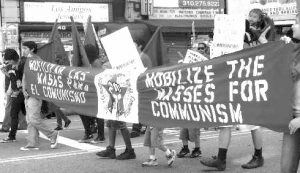Workers Need Communist Revolution, Not Democratic Elections—Part I

At this time in history worldwide capitalism needs fascism and war. Liberal rulers promote elections to try to lull the working class into passivity and divert workers from communist revolution. This is a serious error and a danger for the working class. For this reason, Red Flag is beginning a series of articles looking at democracy as a form of the oppressors’ class dictatorship. We invite comments, suggestions and contributions.
CALIFORNIA, USA—“Democracy is a fraud,” said a teacher who recently joined a study group led by ICWP. “It’s like student government in high school. Students get to pick what color balloons they’ll have at the prom. But politicians paid and bought by big business pick what skills and ideas they’ll be taught.”
Democracy isn’t worth defending. Even as governments shift to the right, it’s not worth defending. Even as that shift enables waves of thuggery. Even as racist and sexist attacks on minority groups, immigrants and others spike, as health care and benefits are cut, democracy isn’t worth defending.
The prospect of fascism developing unleashes a groundswell of anger among the people. The masses are awakening politically. Revolutionary opportunity sits side by side with reformist danger. The liberal forces, who just yesterday were exposed as inept, today try to channel the energy and anger of the masses into elections. The answer to a Trump in the USA or a Modi in India is not a more representative democracy, but a communist revolution.
In pre-class society, food and other essentials of life were shared according to need. We have learned how that worked from modern hunter-gatherer societies like the !Kung San in African’s Kalahari Desert. Decisions were made and carried out by all adults in council arriving at a consensus. Communists see this as a good start in understanding how the communism we’re fighting for will work.
Democracy claims to give all citizens—rich or poor—an equal say in the important decisions about what happens in society. Its history shows otherwise! Democracy masks the reality of class society—where the majority of people are wage slaves exploited by those who own the means of production. It stands in the way of an inclusive society, stabilizes class rule and government of the elite over the masses.
If we want to build a classless world free of oppression and exploitation, we need to trust each other. We need a society organized to promote open and honest discussions, where people say what they mean and mean what they say. We need a society where people work only to meet the needs of others.
Private property in the hands of a few became institutionalized in class society. Kings and lords used religion and state violence to hold on to what they stole from the masses—largely agricultural products. Ancient society (and throwbacks like feudal society) saw wealth based on land. Since in any given political zone there are limits to the land worth owning, this led to a small but stable group of landowners running the demands of state
Democracy arises from a society producing things for private profits. It is the political form of commodity production. The rise of a new type of wealth—merchant wealth from trade and production—began to rival and then surpass that of the landed aristocracy. Pressure grew for an expanded ruling class and a more dynamic type of government. They called it democracy—but it was really the dictatorship of the rich!
Such a society lacks social cohesion by its very nature. No wonder then that the single most inclusive act modern democracy offers the masses is the secret ballot. It doesn’t matter what we say in public, it only matters what we vote in private. The main mass institution of democracy chooses secrecy over openness. It promotes fragmentation over social cohesion. It champions deceit!
Organizing society to only produce for social need will require a different – a more straightforward—political form. This is the communist political form we will develop as we organize a revolutionary new way of life. It will grow out of our day to day collective and cooperative activity of producing things for other human beings. Struggling to meet the needs of living human beings – not the hoarding of lifeless cash-money – will be the glue that binds us together. The idea of communist collectivity is a compelling political vision. It is one that we can begin to build now as we develop communist social relationships.
The next article in this series will look at democracy and chattel slavery in ancient Greece and 17th Century England.
Front page of this issue

